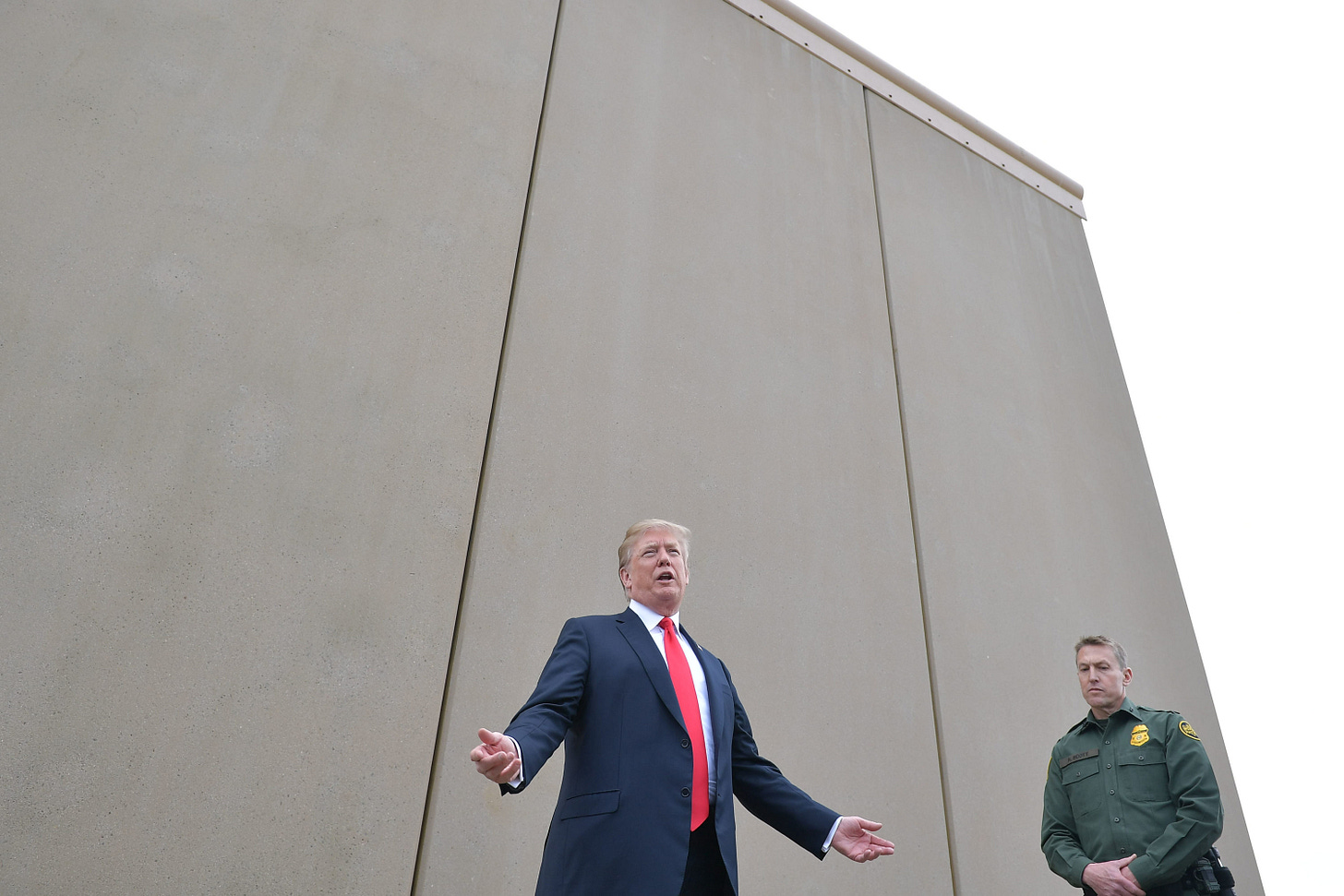Immigration Reform Can Help Revive Democracy
Welcoming immigrants isn’t just about the economy. It’s about what America stands for—and what it stands against.

Six days after instigating an insurrection that led to the death of a police officer, President Trump traveled to the U.S.-Mexico border to try to resurrect his image as a law-and-order president.
This is a fitting end to a presidency that began with a descent down a golden escalator in 2015. Then-candidate Trump claimed, “When Mexico sends its people, they’re not sending their best.… They’re bringing crime. They’re rapists.”
Based on the rhetoric and policies of the Trump administration, it’s no surprise that hate crimes against Latinos and Asians have steadily increased in recent years. Anti-Hispanic hate crimes rose 8.7 percent from 2018 to 2019, the fourth straight year of escalating numbers. One group tallied 2,583 anti-Asian hate incidents just between March and August of 2020.
Don’t think that once Trump leaves office, his focus on immigrants and immigration will wane. As a Biden administration begins to reverse Trump’s immigration policies, the disgraced former president will lead his forces as a battering ram against democracy, and anti-immigrant sentiment has animated his base from day one.
Why do the forces against democracy hate immigrants so much? For generations, immigrants and refugees have come to the United States to realize the freedom and opportunity our democracy allows. This isn’t a story about the fairytale of American exceptionalism. It is the history of America standing up, imperfectly at times, for the rights of people to live within a nation of laws that treat people humanely, practice their religion, voice their opinion, and reach their fullest potential.
America stands for the proposition that, as Alexander Hamilton wrote in Federalist No. 1, “societies of men are really capable… of establishing good government from reflection and choice.” Indeed, the enthusiastic, patriotic participation in the republican project by every wave of immigrants from every corner of the world who chose to come here has only enhanced the American idea.
Muslims in China persecuted for their faith, Hondurans living under the thumbs of violence and corruption, Syrian refugees stranded in Turkey, and so many others see the United States as a land of hope.
At least they used to.
After four years of turning our back to the world, slashing legal immigration, bringing refugee resettlement numbers to historic lows, and staggering through what should be a peaceful transition of power, the very authoritarians who migrants attempt to fleearemocking us.
The schadenfreude dripped off the page as China Foreign Ministry spokeswoman Hua Chunying said, “We hope that the American people can enjoy peace, stability and security as soon as possible.”
Konstantin Kosachev, the chairman of the foreign affairs committee of the upper house of the Russian parliament said, “The celebration of democracy is over.”
Turkey sarcastically urged “restraint and common sense.”
Venezuela quaintly condemned the “spiral of violence.”
Soon, we will welcome a new president and the long process of healing will begin. Restoring our democracy, and our role in the world, will require us to look within to understand what has put us where we are.
We cannot ignore the reality that identity-driven polarization defines our times. Over the last decade, in both the U.S. and Europe, the opponents of liberal democracy have weaponized the migration of people to deepen the internal divisions in our societies.
As Eric Kaufmann wrote in his 2017 bookWhiteshift, “I cannot stress enough that national perceptions are far more important in shaping people’s views on immigration than local experiences.” I would take it a step further. American’s understanding of immigration in their community is linked to their perception of global migration. What people believe is happening in the world overshadows what they actually experience in their own neighborhoods, much less the numbers of immigrants who actually enter the country. When it comes to immigration, perception is reality for many.
Well-funded and powerful opponents of immigration understand this. So, as the world emerges from the COVID-19 pandemic and various immigration processes restart, anti-immigrant forces will use the playbook of years past. They will want the American public to think global migration is out of control, and that the Biden administration’s immigration policies take away freedom and opportunity.
For them, an inclusive nation with people from different ethnic, cultural, and religious backgrounds is a threat to their way of life. In this way, the opponents of immigration become opponents of democracy as well. They will use immigration to turn cities against suburbs, rural against urban.
But those divisions may not be as deep or wide as they expect. Seared into the mind of voters who elected Joe Biden, from progressive activists to conservative suburban parents, were the travel ban, the slashing of refugee resettlement, the separation of children, the deep cuts to legal immigration, the cruel treatment of Dreamers. This broad coalition that supports Biden seeks a different path on immigration.
Herein lies the opportunity. Reforming our immigration system is much greater than the needs of Latino and Asian voters, and much more consequential than our economic competitiveness.
After the incidents of January 6, reforming our nation’s immigration system is about America’s leadership role in the world, the strength of our democracy, and our belief in freedom and opportunity. Offering refuge to victims of persecution, while marginalizing their persecutors on the world stage, is the historic and proper role of the U.S. Creating equal and legal immigration pathways for workers and families serves the interests of the American worker and their family. Creating an opportunity for the millions of undocumented immigrants toiling in the shadows of our economy to earn citizenship sends a clear message that work is valued.
This modernized immigration system tells the autocrats, and the people living under their rule, that the United States may not be aperfect country, but, at our best, we share a deep belief in the idea that all people have—and should be treated with—dignity.

